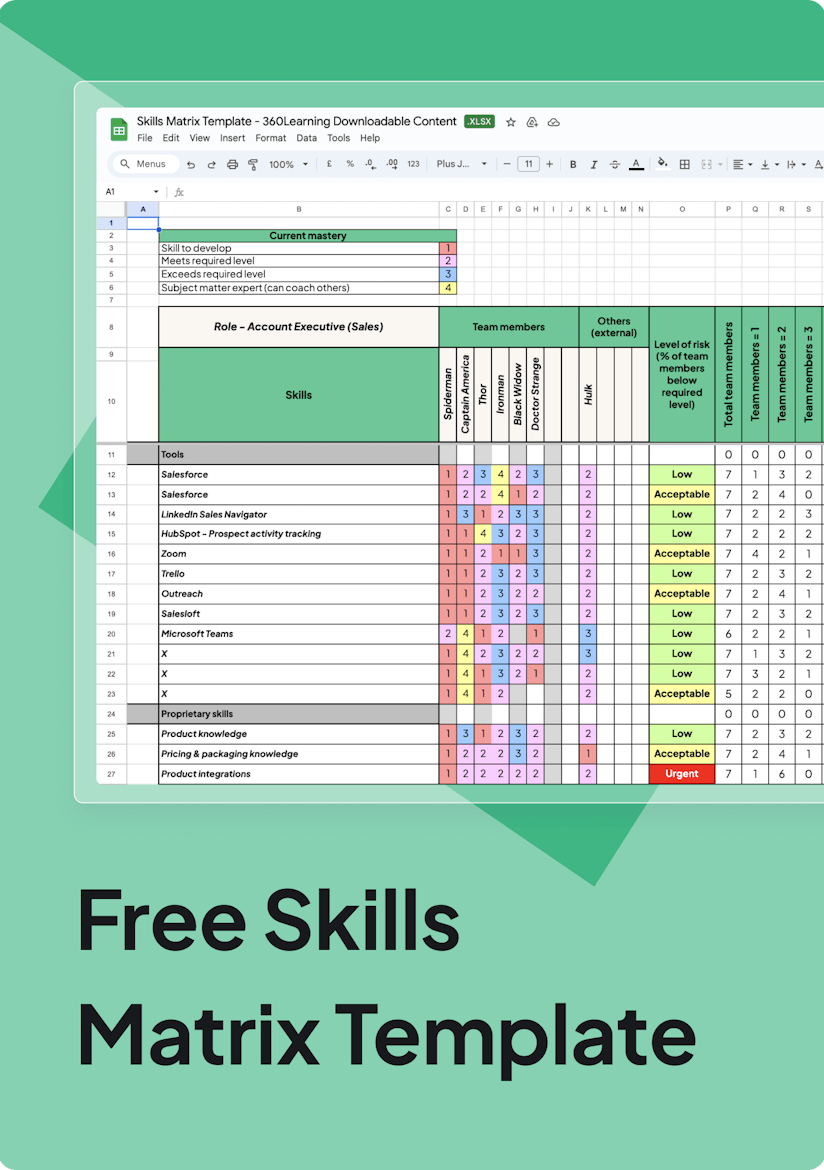
Discover the learning platform powered by collaborative learning.
A 15-minute discussion with an expert
100% tailored to your needs - with ❤️
No commitment. Free as can be.
Staying competitive means evolving to meet new challenges. For learning and development (L&D) experts, effective skills management is crucial. This process ensures your workforce has the right skills to tackle current and future demands.
Which directly drives organizational success.
Thorough skills assessments let L&D professionals make informed decisions about training, recruitment, and development. But this process isn’t easy, and keeping your strategy up-to-date can be just as challenging.
This guide explores the nuances of skills management, from assessment methods to strategic implementation. You’ll find the tools and insights needed to build a resilient, future-ready workforce.
Skills management is the process of developing and matching employee skills with the needs of the organization. Done well, the process is ongoing and iterative, evolving to meet the new demands in your particular industry and the wider business world.
It typically involves a structured framework that helps to measure skill attainment among team members. This in turn lets you set out action plans (evaluation, training, recruitment) to keep developing employee skills.
The most important skills to manage and monitor will depend on your business goals and organizational structure. These could include:
Your skills management plan will include a mix of the above. Some will be equally important for all team members, while others will be role-specific.

By providing your contact info, you agree to receive communications from 360Learning. You can opt-out at any time. For details, refer to our Privacy Policy.
Today, upskilling and reskilling are crucial aims for L&D professionals. Organizational goals and job-specific requirements keep changing, and companies can’t afford to rest on their laurels.
You may have a highly-skilled, top-performing team in place today. But two reasons to think twice:
And fundamentally, companies need new skill sets to remain competitive. Industries are constantly upended and disrupted by emerging technologies and ways of working. You must adapt to survive and thrive.
And successfully doing so requires effective skills management.
A skills-based approach to learning requires an accurate understanding of the skills you have in the organization. Both at the individual employee level and across the business.
A skills audit is a good starting place. This lets you define the skill sets you need in each department, and then determine whether or not you have them in place.
Skills assessments should also be built into performance reviews, to help individual employees develop and perform in their roles. Some of the most common ways to assess employee skills include:
These interviews and assessments can then feed into a more formal skills matrix. This is a record of the current skills levels by team, role, and across the company.
Good skills management lets you make the most of your human capital. And good skills assessments let you objectively chart the skills levels and competencies you have in-house.
They’re also a great way to help each employee own their own career progression. Skills assessments show them where they are today (versus where they would ideally be), and what specific skills should be prioritized in their development plan.
Most importantly, well-designed assessments create objectivity. Performance and aptitude should be judged impartially, and not just using a manager’s opinions and perceptions.
For the business as a whole, assessments provide a few further advantages:
On top of the benefits to organizations and employees mentioned above, there are a few key strategic advantages to an effective skills management approach:
Skills management must be central in any successful organization. But it’s not easy.
Implementation requires:
An HR department cannot manage all of this information alone. It is therefore crucial to centralize information in real time and update constantly.
This almost always requires great tools. We’ll explore these shortly.
At the risk of needlessly repeating the point, you need an intentional skills strategy. Many (or most) of the skills you need may already be in place. Others may be easy to train or to hire for.
But if you don’t prioritize skilling and build a focused plan, you can’t ensure success.
Using a hybrid and dynamic framework is one of the bases of skills management. It lets you map the important skills for each job or role in your structure, including management positions.
This is also sometimes known as a skills matrix or skills ontology.
The idea is to list all technical and transferable skills in a document, which is used by HR and managers in hiring, training, and performance reviews.
At the company level, you have a clear map of the skills you need, where you’re already strong, and where to target your development and recruitment efforts.
And individuals have objective, comparable data points to understand what they do best, and how they can perform better.
Done manually, it’s a lot of work. Which is why the next point is crucial.
A good learning management system (LMS) is invaluable. A collaborative platform is even better. And one that puts skills-based learning first is an absolute gem.
Using an LMS for skills management lets you:
Implementing a new skills management platform is your opportunity to streamline decision-making, and to break down the barriers between skills to benefit the entire organization.
The upshot of a strong skills management plan is you can get much more strategic about workforce planning. You’ll know the constraints in your internal and external environment, and can allocate skills in the right place and at the right time.
Which is the exact goal of strategic workforce planning.
In practice, this means asking questions such as:
Much like skills management itself, strategic workforce planning requires focus and effort. But with a solid skills approach, you have the information and framework you need to make these informed, strategic choices.
This guide delved mostly into the theory and benefits of good skills management. But in truth, it’s the tools that make the difference. Without a great skills LMS at your side, there’s an immense amount of work ahead of you.
360Learning is the only solution that combines collaborative learning strategy and skills management. With this approach, your internal experts can create personalized training, adapted to each context, with minimal effort.
L&D managers are easily able to:
Chat with our skills management experts to find out more. We can’t wait to show you around.
A 15-minute discussion with an expert
100% tailored to your needs - with ❤️
No commitment. Free as can be.
By providing your contact info, you agree to receive communications from 360Learning. You can opt-out at any time. For details, refer to our Privacy Policy.